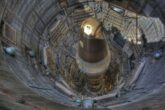October 25, 2023
Sharper: AUKUS
Analysis from CNAS experts on the most critical challenges for U.S. foreign policy.
The AUKUS partnership among Australia, the United Kingdom, and the United States began as an agreement to provide Australia access to nuclear-powered submarines and various defense technologies, but the relationship plays a key role in deterring evolving threats in the Indo-Pacific. Australian Prime Minister Anthony Albanese is in Washington on an official state visit to discuss progress on AUKUS as well as critical minerals supply chains, climate and green technologies, infrastructure development, and maritime security. CNAS experts are sharpening the conversation on the progress made in the AUKUS agreement this year and what challenges lie ahead. Read the latest edition of Sharper to explore their ideas and recommendations.
Features
No I in Team: Integrated Deterrence with Allies and Partners
The U.S. Department of Defense advanced the concept of integrated deterrence in the 2022 National Defense Strategy (NDS). Integrated deterrence seeks to integrate all tools of national power across domains, geography, and spectrum of conflict, while working with allies and partners. But what integrated deterrence entails in practical terms remains unclear, particularly to the very allies and partners Washington wants more from. This ambiguity raises the risk that integrated deterrence may find itself dead on arrival—and along with it, the ally and partner line of effort in the NDS. A report from Stacie Pettyjohn and Becca Wasser developed a framework to help the department think about and implement its strategy of integrated deterrence with allies and partners.
Gaining the Asymmetric Advantage: Emerging Technology and the AUKUS Pillar 2 Promise with Prof. Tanya Monro
Australia’s contributions to emerging technologies and advanced defense capabilities are critical to the balance of power in future strategic competition with China. Given the unlikeliness that any country can gain the asymmetric advantage alone, combined capability development and technology sharing represent an important path forward for the United States and its allies. On Wednesday, September 20, CNAS hosted Prof. Tanya Monro AC, Australia’s Chief Defence Scientist, to discuss the latest developments and challenges in developing emerging technologies and delivering advanced defense capabilities under AUKUS Pillar 2.
No I in Team
The United States faces a strategic landscape unlike anything it has encountered in its recent history. It faces a rising great power in China, a diminished but still dangerou...
Mission Brief | Gaining the Asymmetric Advantage: Emerging Technology and the AUKUS Pillar 2 Promise with Prof. Tanya Monro
Becca Wasser
Sep 20, 2023
AUKUS Optimal Pathway Announcement
On March 13, 2023, President Biden, British Prime Minister Sunak, and Australian Prime Minister Albanese announced a pathway for Australia to acquire conventionally armed, nuclear-powered submarines under the Australia, United Kingdom, and United States (AUKUS) partnership. Following this announcement, CNAS experts analyzed the potential impact of this decision and the strength of the AUKUS partnership generally.
Building a Networked Security Architecture in the Indo-Pacific with Ely Ratner
The March 13 announcement of the optimal pathway for completing Pillar One of the AUKUS initiative and Japan’s announcement last December of a new set of defense policies, including developing counterstrike capabilities to deal with escalating missile threats in the region, indicate progress. What do these developments mean for the future of security and deterrence in the region? What further steps can we expect from the Biden administration to build out a system of networked deterrence? Dr. Ely Ratner, Assistant Secretary of Defense for Indo-Pacific Security Affairs, joined Lisa Curtis, Senior Fellow and Director of the Indo-Pacific Security program, at CNAS to discuss these issues and more.
CNAS Responds: AUKUS Optimal Pathway Announcement
Yesterday, March 13, 2023, President Biden, British Prime Minister Sunak, and Australian Prime Minister Albanese announced a pathway for Australia to acquire conventionally ar...
Building a Networked Security Architecture in the Indo-Pacific with Ely Ratner
The March 13 announcement of the optimal pathway for completing Pillar One of the AUKUS initiative and Japan’s announcement last December of a new set of defense policies, inc...
Commentaries
AUKUS Has Big Technology Hurdles with Some Very Big Rewards
“Enthusiasm for AUKUS endures at senior levels on both sides of the Pacific, which stands to reason: its fulfillment would add real allied defense capability in the region where it matters most,” writes Richard Fontaine in Australia Financial Review. “As the military balance across the Indo-Pacific deteriorates in China’s direction, AUKUS can represent a step toward repairing it. It’s worth recalling that the pact is fundamentally a defense technology sharing agreement. It is not primarily a new diplomatic platform and certainly does not represent some new tripartite alliance. Rather, AUKUS is a mechanism that would permit collaboration on technologies – including but not limited to nuclear propulsion for submarines – that would otherwise be impossible. That, in turn, promises to supply each of the three members with new military capabilities they would lack in the absence of it.”
AUKUS Is More Than Submarines: Its Advanced Capabilities Pillar Will Also Require Fundamental Shifts
“The advanced capabilities element of the AUKUS agreement will be crucial to challenging that trajectory,” argue Lisa Curtis, Justin Bassi, and Maeve Ryan in Just Security. “But to meet that goal will require a series of fundamental shifts in strategy and tactics from the AUKUS allies. The United States will need to adjust its export control policies and laws; Australia and the U.K. will need to prove they have both the capability and capacity to pursue such a complex multi-faceted endeavor; defense and technology companies in all three nations will need to consider how they can enhance collaboration with one another; and finally, the three partners need to figure out how to expand the security collective to other trusted partners.”
Why the New Alliance Between the U.S., UK, and Australia Is So Important to Indo-Pacific Security
“AUKUS is a long-term endeavor,” notes Lisa Curtis in The Ripon Society. “While Australian naval officers are already receiving training in the United States and U.S. nuclear-powered attack submarines (SSNs) have begun regular visits to Australia, it will take more than 15 years before Australia can produce its own SSNs. In the interim, the U.S. has announced it will transfer three to five Virginia-class submarines to Australia over the next decade while Canberra ramps up indigenous capabilities. Nuclear-powered submarines are critical for deterrence in the Indo-Pacific as they allow for longer duration deployments and can operate in contested waters at lower risk, given their greater maneuverability and stealth capabilities.”
AUKUS Has Big Technology Hurdles with Some Very Big Rewards
Amid the rise of Chinese power and the changing Indo-Pacific dynamic, allies like Australia and the US must work together even more closely than before....
AUKUS Is More Than Submarines: Its Advanced Capabilities Pillar Will Also Require Fundamental Shifts
The leaders of the trilateral partnership should demonstrate the importance of AUKUS by cementing its place on the international agenda....
Why the new alliance between the U.S., UK, and Australia is so important to Indo-Pacific security
AUKUS demonstrates that the United States and its allies are prepared to act in unison and break down the barriers to sharing the most advanced military technology to maintain...
In the News
Featuring commentary and analysis from Becca Wasser, Richard Fontaine, Lisa Curtis, and Stacie Pettyjohn.
The Laidback Australian City Key to Countering China
Defence strategist Becca Wasser has spent years wargaming what might happen in the event of a conflict in the region. In most of the scenarios she's run, China does attempt mi...
Policy, Guns and Money: AUKUS challenges and opportunities
In this special episode, ASPI Executive Director Justin Bassi speaks with Richard Fontaine and Lisa Curtis from the Center for a New American Security and Alessio Patalano fro...
The Existential Threat to Aukus: Choking on US Red Tape
“It’s bureaucracy and different bureaucracies and multiple ones,” said Stacie Pettyjohn, a senior fellow and defence programme director at the Centre for a New American Securi...
AUKUS, deterrence and US foreign policy with Becca Wasser
Becca Wasser joins Justin Bassi for a conversation on AUKUS, integrated deterrence and US foreign policy. Becca details some of the strategic challenges Australia and the Unit...
About the Sharper Series
The CNAS Sharper series features curated analysis and commentary from CNAS experts on the most critical challenges in U.S. foreign policy. From the future of America's relationship with China to the state of U.S. sanctions policy and more, each collection draws on the reports, interviews, and other commentaries produced by experts across the Center to explore how America can strengthen its competitive edge.
Subscribe
Sign up to receive the latest analysis from the CNAS expert community on the most important issues facing America's national security.
More from CNAS
-
The Astronomical Cost of Defeating ‘Any Foreign Aerial Attack’
Building Trump’s proposed missile and air defense system would be an enormous task — and the president’s spending target is likely just a fraction of the final price. CNAS adj...
By Becca Wasser
-
The U.S. Military Needs to Relearn Nuclear Signaling
This deterioration matters because beyond the quantity and quality of the United States’ nuclear forces, nuclear deterrence will rest on the country’s ability to effectively s...
By Philip Sheers
-
From Production Lines to Front Lines
Executive Summary The U.S. defense industrial base (DIB) is struggling to meet the demands of the current strategic environment—let alone prepare for a potential conflict agai...
By Becca Wasser & Philip Sheers
-
More than the Sum of its Parts: Developing a Coordinated U.S.-Australian Response to Potential Chinese Aggression
If China engaged in a war of aggression, the United States, Australia, and other nations would not have much time to develop a coordinated response....
By Stacie Pettyjohn














